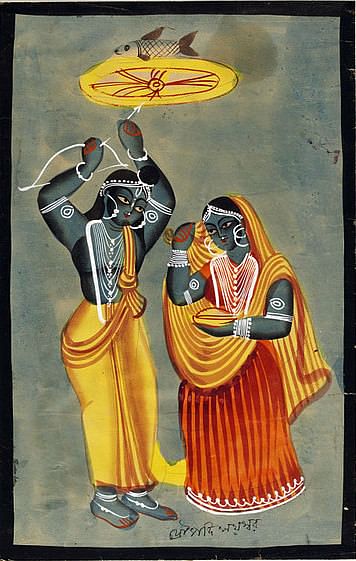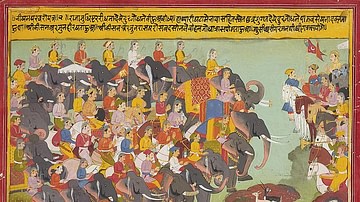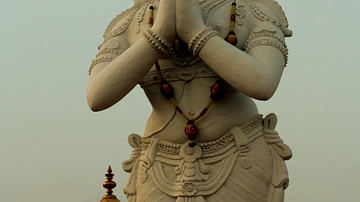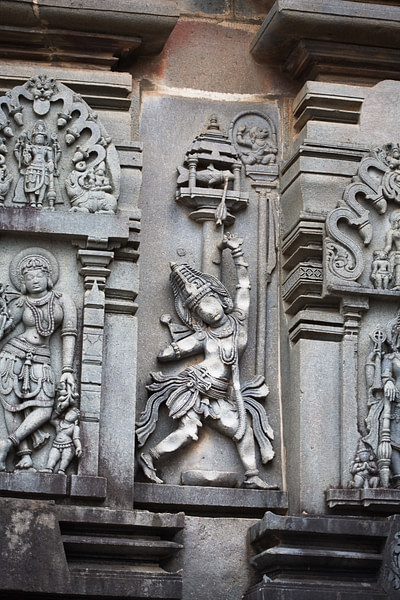
Arjuna (also given as Arjun) is the great hero of the Indian epic Mahabharata and the philosophical-religious dialogue Bhagavad Gita. His name means “shining”, “silver” and similar terms relating to brightness. He is the most popular champion in Hindu literature, a demigod (son of the storm god Indra), and the third of the famous Pandavas, the five noble brothers who serve as the protagonists of the Mahabharata. Arjuna represents the best aspects of humanity:
- Courage, Strength, and Humility
- Intelligence and Wisdom
- Commitment to Truth and Justice
- Performance of Dharma with Karma (Duty and Right Action)
At the same time, however, he is flawed in that he is stubborn, adheres to a personal code of honor which does not always consider the needs of others or the greater good, and is overly proud of how he comports himself and his reputation.
Throughout the Mahabharata, Arjuna has more adventures and is featured more prominently than any of the other characters. This is all the more impressive in that the work carefully develops even seemingly minor characters with intricate backstories. In the Bhagavad Gita, which was originally part of the Mahabharata, Arjuna takes center stage in the role of the seeker-student to the god Krishna's role of teacher-guide. Arjuna initially refuses to take part in the Kurukshetra war until he is convinced that he must by Krishna who explains to him his duty to himself and others and the ultimate meaning and order of existence.
In this work, Arjuna stands for all who face difficult circumstances and choices in life and question what they should do and why they must suffer. He also stands as a model of behavior, however, in that he sets aside his pride and reputation to honestly express his fears and doubts and to then accept help and counsel from another. These qualities have contributed to his standing as the best-known character of Indian/Hindu literary tradition and, once the works were translated into other languages, of world literature and mythology.
Family, Birth, & Character
Arjuna was the supposed son of the king Pandu who was half-brother to the blind king Dhritarashtra. When they came of age, Dhritarashtra (as the oldest) should have become king of their land of Hastinapur but could not because the law forbade those with disabilities from rule and so Pandu was chosen. Pandu married the princess Kunti as his royal wife and another woman, Madri, as second wife, while Dhritarashtra married another princess named Gandhari. Years later, once Pandu had expanded the kingdom and all was running smoothly, he requested leave to take some time with his wives and went to the wilderness, leaving the kingdom temporarily in Dhritarashtra's hands. While he was gone, Dhritarashtra and Gandhari had 100 sons (the eldest of whom was the prince Duryodhana) known as the Kauravas.
Years passed and Kunti returned from the wilderness with five sons – Yudhishthira, Bhima, Arjuna, and the twins Nakula and Sahadeva – as well as the corpses of Pandu and Madri. After funeral services were completed, the boys and their mother moved into the royal palace. The five Pandavas were all conceived through supernatural means. Pandu was unable to have sexual relations with a woman because of a curse placed on him, but Kunti had been granted a favor by the gods that she could call upon any deity at any time to conceive a child. In Arjuna's case, this was the storm god Indra.
The supposed sons of Pandu and those of Dhritarashtra grew up together in the palace and were trained and educated by the same teachers. Drona (an incarnation of the god Brahma) was their teacher for military arts and weaponry and his school attracted the noble youths of other families including a young man named Karna of the Suta clan. Karna was actually the eldest of the Pandavas, Kunti's first son by the god Surya, but his family and lineage was unknown, even to him, until his hour of death.
Karna was an excellent archer and so a rivalry developed between him and Arjuna, also exceptionally skilled. The rivalry turned bitter on Karna's part when it became clear that Drona favored Arjuna. In order to make clear to all why he loved Arjuna, Drona called an assembly of his students at a lake, not explaining why, and, when they arrived, they saw their teacher out swimming. Suddenly, Drona was attacked by a large crocodile and, of all those gathered, only Arjuna came to his aid, fighting off the crocodile and bringing his teacher to the shore. Drona then explained that the crocodile had been an illusion of his own creation and he had never been in any actual danger but Arjuna, like the others, could not have known that; even so, only Arjuna had been selfless and brave enough to risk his life to save his teacher.
At about this same time, the legitimacy of Dhritarashtra's reign finally came into question since, as a blind man, he was only supposed to have been holding the throne until Pandu returned. Accordingly, he declared Yudhishthira his heir and crown prince, which enraged Duryodhana. Duryodhana unofficially adopted Karna as his brother and began to plot the destruction of the Pandavas whom he felt had returned only to prevent him from succeeding his father as rightful king of the realm.
Exile & Draupadi
Duryodhana's first attempt to rid himself of the five brothers was inspired by a fair in a village nearby. He suggested to his father that Kunti and her five sons should go, stay in a place prepared for them, and enjoy themselves; Dhritarashtra agreed and the family was sent. Meanwhile, Duryodhana had a house created of all flammable materials for them to stay in which would go up in flames quickly once lit and consume anyone and anything inside.
The Pandavas were warned of Duryodhana's plan by their uncle Vidur who sent them a miner to dig a tunnel beneath the house. The Pandavas hosted a grand party and invited all the people of the village to their home, where everyone ate and drank heavily deep into the night. Among the guests were a woman from the wilderness and her five sons who burned to death in the house when the fire was set while the Pandavas and their mother escaped through the tunnel into the forest. The next morning, the burned bodies in the house were presumed to be those of Kunti and her sons and Duryodhana believed his plan had succeeded.
The Pandavas, meanwhile, began a life disguised as a brahmin family who had become poor and moved from village to village. The brothers would go out during the day and beg for alms which they would bring back to Kunti who would divide the food between them all. One day, they learned of a festival taking place in the kingdom of Panchala to award the hand of the princess Draupadi in marriage and decided to attend.
Many suitors arrived to compete in the archery contest to win Draupadi. A pole was erected in a pool of water with a handmade fish-target revolving at the top. Each suitor was to raise and string a heavy bow and shoot an arrow into the eye of the fish but had to do so by looking down at its reflection in the pool. The suitors all failed one by one, but Arjuna was able to win easily as he was the greatest archer in the land.
Draupadi was given to Arjuna who took her back to their home and, as they arrived in their yard, they called out to their mother to come see what they had brought. Kunti, who was inside the house meditating, thought they had brought alms and, without getting up to look, told them to share whatever it was equally among themselves. The brothers had always done exactly what their mother told them to and so Draupadi became the wife of all five brothers who agreed each would have her exclusively for a year before she was passed to the next.
Draupadi's brother, Dhrishtadyumna, had been upset by the results of the contest which seemed to have doomed his noble sister to a life married to a poor brahmin and so had followed them along with Krishna and some others who believed the “poor brahmin” had to be Arjuna. The Pandavas' identity was revealed and a wedding celebration was held which included Dhritarashtra and his sons. Dhritarashtra divided his kingdom in half and gave a part to the Pandavas who quickly turned it into a lush paradise through their various exceptional skills.
Self-Exile & Adventures
The kingdom of the Pandavas, Indraprastha, flourished in part due to Arjuna's great care for the people. His devotion to their welfare and commitment to honoring his word created a conflict, however, which would result in his self-exile. Among the stipulations agreed upon by the brothers for sharing Draupadi was that none of them would disturb or intrude upon the one who was alone in a room with her; if they did, they would have to endure exile for a year.
One day, however, a man came pleading for Arjuna's help against cattle thieves but Arjuna had left his bow and arrows in the room occupied by Draupadi and her then-husband Yudhishthira. Arjuna's choice was to either fail in his duty to protect a citizen's cattle from thieves or subject himself to exile. He did not hesitate to retrieve his bow and save the cattle and then departed the kingdom, even though Yudhishthira, Draupadi, and all the others begged him to stay.
During exile, Arjuna would marry other women, have children, and engage in various adventures such as the burning of the Khandava Woods. Arjuna and Krishna, who accompanies him, come across the god of fire, Agni, who needs to burn the forest and nearby village in order to fulfill his duty. He has been prevented in this by Indra who sends a rainstorm to put the fire out each time Agni ignites it. Arjuna agrees to help, and Agni calls on the great sky god Varuna for help who gives Arjuna the mighty, unbreakable bow known as Gandiva as well as a magical chariot with horses that never tire and cannot be wounded. Arjuna then fights his father Indra for Agni's right to fulfill his duty, wins the battle, and Agni is free to unleash his fire.
Loss of the Kingdom & Exile
Arjuna saves a man from the fire, Maya, who was an exceptional architect and, when his exile is over, brings him back to the kingdom of the Pandavas where Maya designs and builds a great palace for the brothers. The floors shine so brightly and are so smooth that they appear to be water. When Duryodhana comes to see it, he steps into the reception hall and believes it to be a pool and so draws up his pants and tiptoes across it. Draupadi, looking on, laughs at him, and Duryodhana, realizing his mistake, lets his pants down but then falls into an actual pool in the center of the hall, eliciting more laughter from Draupadi.
Shamed in front of the court, Duryodhana swears revenge and invites the Pandavas to his palace for a night of gambling, which he knows Yudhishthira enjoys but is not very skilled in. Yudhishthira loses his kingdom, his brothers and himself, and Draupadi in the game but Dhritarashtra returns everything to him. Duryodhana then invites Yudhishthira to a second game with higher stakes: the winner gets both kingdoms while the loser must go into exile for 12 years and, in a 13th year, must live nearby in disguise without being recognized; if they are recognized, they must repeat the 12-year exile and another year in disguise. Yudhishthira loses again, and he, his brothers, Draupadi, and Kunti go into exile.
During this time, Arjuna has many other adventures during which he acquires more magical weapons, visits the whole of the country in service to Yudhishthira or on his own, and is propositioned by the nymph Urvashi. He rejects her advances and she curses him with impotence but, after intervention by Indra, changes the curse so it will only last one year which Arjuna himself may choose.
After the 12 years, the brothers disguise themselves at the court of Virata, and Arjuna claims this as the year of Urvashi's curse, presenting himself as a eunuch and teaching the court women to dance and sing. Toward the end of the year, still in disguise, he defeats an invading army of the Kauravas who believe they have found where the Pandavas have been hiding. The Pandavas keep their identity secret until the year is up when Arjuna reveals himself to Virata.
Battle of Kurukshetra & Gita
The Pandavas have now fulfilled the terms of losing the dice game and demand their kingdom be returned. Duryodhana refuses, however, claiming he will give them nothing. Krishna intervenes and asks for just five cities, one for each brother, but this is also rejected. War is inevitable and both Arjuna and Duryodhana go to Krishna for assistance. Krishna says he will not fight for either side but will assist; each side may choose either Krishna himself alone or Krishna's army. Duryodhana chooses the army while Arjuna chooses only Krishna, claiming he needs nothing more.
The two armies meet at Kurukshetra with Krishna serving as Arjuna's charioteer. Before the battle, Arjuna has Krishna drive him to a place between the two armies so he can look upon them and, when he does, he loses heart. He sees all of the people on the opposing side, people like Drona he has known all his life, and he refuses to fight them. This dramatic scene in the Mahabharata becomes the occasion for the dialogue of the Bhagavad Gita where Krishna explains to the hero the importance of doing one's duty (dharma) in accordance with right action (karma) as dictated by the natural order of the universe.
Arjuna must fight, Krishna says, because the choices made by all involved have brought everyone to this moment and all must now act in accordance with those choices. By refusing to fight, Arjuna is rejecting his purpose in life and, further, denying the truth of existence by claiming that people will be killed when, in fact, there is no such thing as death; the body may cease to function, but the soul is immortal.
In discussing immortality, Krishna reveals himself as Brahman, the source of all existence and existence itself. Krishna's revelation astounds Arjuna but he, like any mortal, cannot remain in that state of pure reality and must retreat back to the world of illusion and doubt he has come to accept as true. Even so, through Krishna's further efforts, Arjuna comes to understand that the reality he has been responding to throughout his life has not been true reality but only shadows and illusion. He has always tried to respond to what he saw as “true” honorably but recognizes that his perception of truth and actual Truth are quite different.
Once Arjuna is convinced by Krishna's arguments, the terrible battle commences in which most of the participants are killed. After a struggle lasting 18 days, the Kauravas are defeated and destroyed as well as almost all of the army of the Pandavas. Yudhishthira and his brothers take back the kingdom and rule for 36 years until they decide to abdicate and leave the world for a life of peaceful reflection on the Divine in the mountains of the Himalayas. One by one they die until only Yudhishthira is left with his faithful dog and then they, too, enter paradise and are reunited with all who were thought to have been lost.
Conclusion
Throughout the Mahabharata and Bhagavad Gita, Arjuna's behavior epitomizes the central values of his culture. His selfless attempt to rescue Drona from the lake illustrates his courage, strength, loyalty and humility in that there is no mention of him boasting of the event afterwards. His intelligence and wisdom are noted in a number of instances while his commitment to what he views as true and just are seen in his taking up Agni's cause against Indra and many other instances including a war he wages against Krishna himself which also illustrates the values of dharma and karma.
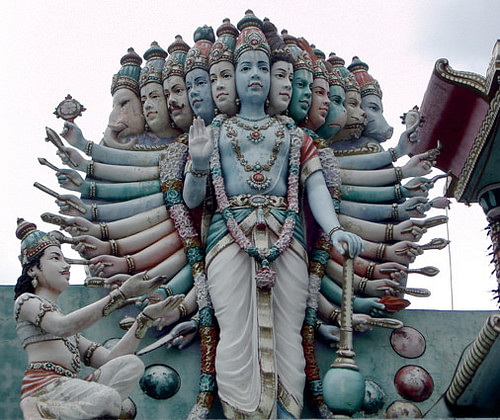
Although possessed of these heroic virtues, Arjuna is still flawed enough for an audience to identify with him. When he chooses to help the citizen retrieve his cattle and drive off the thieves, at the cost of a year in exile for a pledge made to his brothers, he is thinking strictly of his own honor and reputation, not of what a year of his absence might mean for the greater good of the kingdom. When he enters the contest to win Draupadi, there is no indication he is thinking of his brothers or his mother or Draupadi herself and what sort of life he is bringing her into; his thought seems to be focused entirely on winning, on being the best, for his own personal satisfaction.
Like any other great epic hero, Odysseus from Greek literature or Rustum from ancient Persian mythology, it is Arjuna's humanity that defines him as much as his superhuman aspects as a hero. Arjuna's doubt, sorrow, and despair on the field of Kurukshetra mirrors the same everyone has experienced at various times in life. Arjuna has remained as popular as he has because he reflects both who his audience is and who they wish they could be. This paradigm is always the same with hero figures who elevate an audience not only by what they do better than others but by what they struggle with, or even fail at, just like everyone else.

